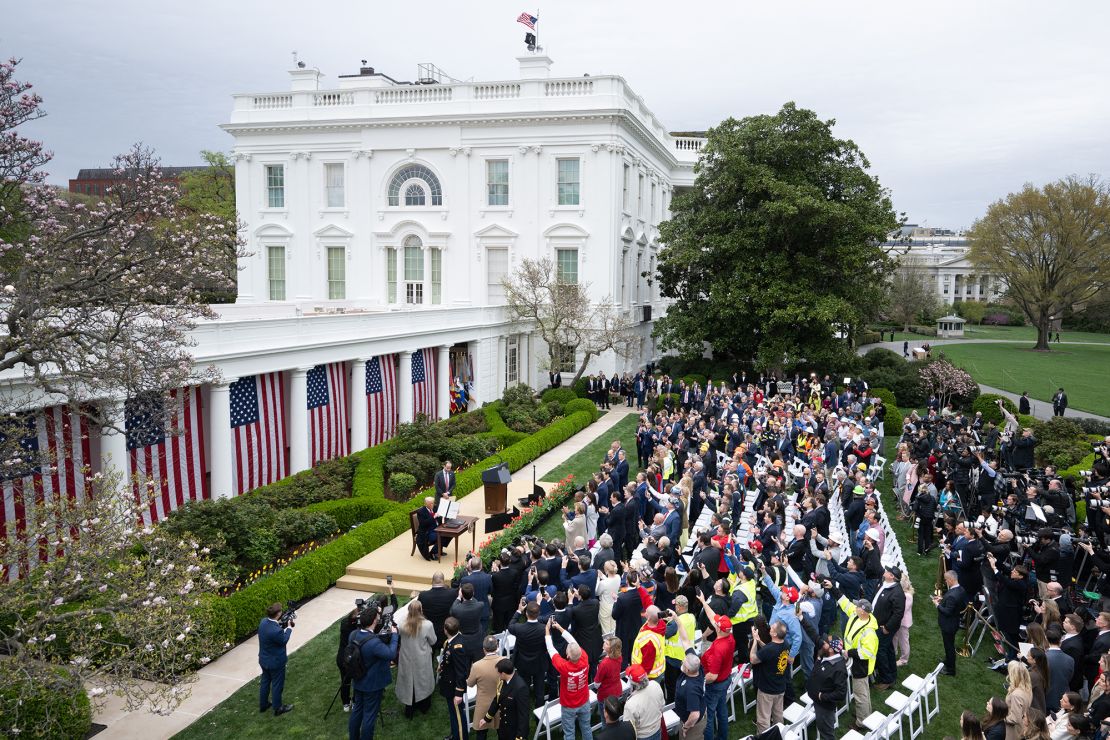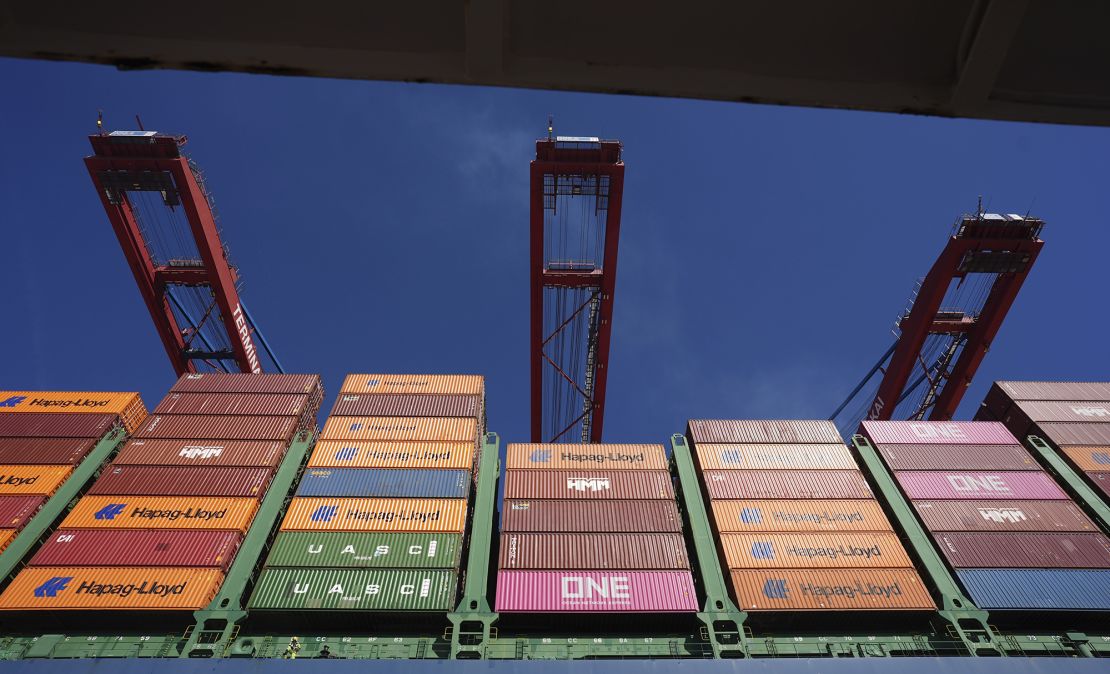London
CNN
—
The saying goes that when America sneezes the rest of the world catches a cold — pithy shorthand to describe how changes in the world’s biggest economy ripple out to impact everyone else.
But that adage doesn’t go nearly far enough to convey the enormity of the likely fallout from US President Donald Trump’s decision to impose a colossal set of new tariffs on America’s trading partners.
“The US isn’t sneezing, the US is hacking off one of its limbs,” Paul Donovan, chief economist at UBS Global Wealth Management, told CNN.
At the start of the year, the American economy was “in a very good place,” he noted. Now, “if these tariffs continue as they are, (it will) probably tip into recession.” And that, he said, will likely have a knock-on negative impact on economies around the world.
On Wednesday, Trump announced a 10% baseline tariff on all goods imports into the United States and even higher tariffs on products from about 60 economies. The harder-hit trading partners include China and the European Union, which face new duties of 34% and 20% respectively.
But America is harming itself as much as, if not more than, other economies with its latest tariffs, analysts say.
A recession in America?
If Trump keeps in place the tariffs announced Wednesday, recession is a likely outcome for both the US and the world this year, JPMorgan said in a note Thursday.
The tariffs will cause prices in America to surge, too, adding close to 2% to the Consumer Price Index in 2025, according to the bank.
The key measure of US inflation has struggled to come back down to earth in recent years and was 2.8% higher in February than a year ago, according to data from the Bureau of Labor Statistics.
“This year’s cumulative tariff hike should be viewed as a US tax increase of roughly $660 billion,” JPMorgan analysts said, noting that this amounted to the largest tax increase in recent decades by far. “The impact on inflation will be substantial.”
The overall economic “shock” from Trump’s tariffs will be exacerbated by any retaliatory measures imposed by America’s trading partners on US goods, the analysts also wrote.
And retaliation is on the cards. In the hours following Trump’s announcement, the EU — the largest single market for US goods exports — said it was preparing countermeasures, and China condemned what it called “unilateral bullying” from the US and vowed to retaliate.

Deep economic downturns are typically marked by mass job losses, bankruptcies and foreclosures — very much the opposite of Trump’s stated ambition to “Make America Wealthy Again” through his tariff plan.
The US president may still suspend or dilute the tariffs announced Wednesday as he has done with other import levies in recent weeks. But any fresh import taxes are likely to slow the US economy, said Donovan at UBS.
Similarly, economists at Deutsche Bank noted “a meaningful increase in recession risk in the US” in research published Thursday.
What about everyone else?
Other economies are expected to take a hit on several fronts.
A recession or slowing economic growth in the US would cause mighty American consumers to pull back on spending, which in turn would lower demand for foreign goods.
If businesses outside the US experience a drop in demand for their products, they may become more cautious, Donovan said. “Are they going to carry on investing, are they going to carry on employing people?”
Deutsche Bank economists expect unemployment to increase in the EU and the United Kingdom over the next 12-18 months as a result of Trump’s tariffs.
The new import taxes could also dent demand for foreign goods in America by making them more expensive than equivalent products made in the US. That, of course, is what Trump wants — the president has said his tariff agenda is designed to lift demand for US-made products and boost America’s manufacturing sector.
Other new headaches for exporters to the US include uncertainty, disruption of supply chains and “burdensome” bureaucracy, according to Ursula von der Leyen, head of the EU’s executive arm. “All businesses, big and small, will suffer from day one… The costs of doing business with the United States will drastically increase,” she said Thursday.

Consumers outside the US will be affected mostly if their governments engage in a tit for tat with the Trump administration.
Thomas Sampson, an economics professor at the London School of Economics and Political Science, told CNN that, without retaliation, the US tariffs’ direct impact on European consumers, for example, would be relatively small. But higher tariffs on US imports into the region would raise prices.
In that case, “European consumers will face the same sort of price increases that US consumers are facing,” he said.
The EU responded to Trump’s steel and aluminum tariffs, announced earlier, by unveiling countermeasures on up to 26 billion euros ($29 billion) worth of exports of American goods, including tariffs on boats, bourbon and motorbikes.
This time, however, the EU may hold fire. France’s finance minister said Friday that the bloc was not looking at reciprocal tariffs to respond to Trump’s latest trade salvo as that could hurt European consumers.
Instead, measures under consideration are targeted at individual firms rather than whole sectors, Eric Lombard told CNN affiliate BFMTV.
Other governments may be less circumspect. “If there’s retaliation by the other countries, you might have similar pressure on inflation in other countries,” Antonio Fatas, an economics professor at business school INSEAD, told CNN.
Still, analysts say America’s trading partners benefit from the simple fact that they will only have tariffs placed on their goods by one country — America — whereas the US faces retaliatory levies on its goods from many of its major trading partners.
Oxford Economics thinks the global economy will still probably avoid a recession this year. But its performance will be nothing to write home about. Growth could fall below 2%, Ben May, director of macroeconomic research, wrote in a report Thursday.
“It would be the weakest annual growth rate since the global financial crisis, excluding the pandemic period,” he said.
Olesya Dmitracova in London and Joseph Ataman in Paris contributed reporting.



